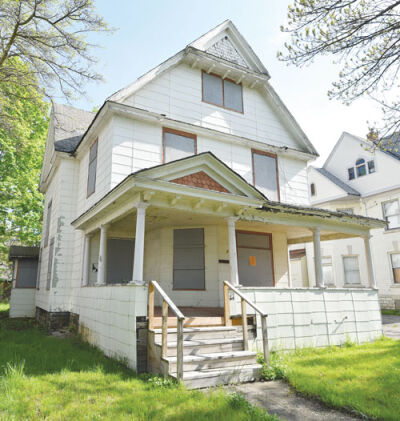
A former West Bloomfield resident was among three women who recently moved into a renovated home in Pontiac as part of a Grace Centers of Hope after-care program. Pictured is the home prior to being renovated.
Photo provided by Grace Centers of Hope
WEST BLOOMFIELD — For some, the phrase “a new lease on life” might seem simplistic.
But for people who have been part of the life-skills and after-care programs offered by Grace Centers of Hope, a nonprofit based in Pontiac, those words can take on a very real meaning.
Three women, including one who was raised in West Bloomfield, recently moved into the 58th home that was renovated as part of Grace Centers of Hope’s program.
Stephanie W. grew up in West Bloomfield and attended Walled Lake Schools. She started the Grace Centers of Hope life-skills program Oct. 19, 2022, and she and two other women moved into a newly renovated home this past April.
“It’s really nice,” Stephanie said. “We live (in) a really good community. Extremely grateful for everyone that helped put that together. My next goal is working to save to buy a house in the Grace community.”
The home, which has seven bedrooms and is approximately 3,000 square feet, is in a section of Pontiac that is referred to as “Little Grace Village.”
According to Darin Weiss, who is the chief operating officer for Grace Centers of Hope, prior to being renovated, the home was dilapidated and an eyesore.
The opportunity that has been granted to Stephanie and others is due in large part to donors who contribute to Grace Centers of Hope.
According to a press release, the home that Stephanie W. moved into was completely renovated at a cost of nearly $400,000.
According to its website, Grace Centers of Hope is Oakland County’s largest and oldest homeless shelter, having offered help to community members since 1942.
Shelter, food, counseling, life skills courses, and a career and education center are among the benefits for those who seek out help.
After going through a one-year life-skills program, some choose to be part of GCH’s after-care program, which includes living in a renovated home.
Weiss explained part of the journey individuals go through to have an opportunity to move into a renovated home.
“Once a resident has been able to complete the one-year life-skills program, they have an opportunity to move into our after-care programming, which is made up of homes in the Pontiac area here — they’re all clustered on the same couple of streets of homes that have been renovated back to their original architecture. They can stay in our after-care programming for up to two years with their kids while they work (and) get their life back; they begin paying rent,” Weiss said. “They can continue to receive counseling (and) other services via Grace Centers of Hope and our church, Grace Gospel Fellowship. … Once a person has completed after-care, they have an opportunity to either stay living within that community or even purchase the house.”
Weiss estimated that the rental cost to the occupants is $475 per month.
He said that a lot of Grace Centers of Hope graduates have transitioned from homelessness to home ownership.
The life-skills program takes place at the Grace Centers of Hope facility in Pontiac at no charge for those who live there during that time period.
Kent W. Clark, who is the CEO of Grace Centers of Hope, previously stated that individuals who live at GCH are tested for drugs regularly and must show themselves to be drug-free to qualify to move into an after-care program.
He also stated that having a full-time job is a requirement and that those who move into an after-care home are still tested for drugs. If it is discovered that they have used drugs or alcohol, they are sent back to the Grace Centers of Hope facility for 30 days, according to Clark.
“Without accountability, you have no program,” Clark previously stated. “There has to be something expected back from the folks here.”
Stephanie said that since entering the Grace Centers of Hope program, her life is “a lot better now.”
“Grace kind of had someone there with me, like the whole time, as I was changing my life, living one way as a single parent, to coming into a Christian community — being loved on, having pastors and positive support around you all the time — sisterhood,” she said. “So it helped regain my confidence. Now I have a great job. I used to take the bus here; now I own my own car.”
From Weiss’ perspective, those who go through the program come away from it with a new purpose.
“They learn about their inherent dignity and value and worth, in spite of, maybe, mistakes they’ve made in their life,” he said. “People are able to, in many cases, recover from substance abuse (and) homelessness, but more importantly, have a better outlook in life, something to live for and live their dreams. People have not just gotten their GEDs, but college degrees.”
According to Weiss, they have also learned skills and trades and became homeowners and started families. “There’s a lot of that,” he said.
Stephanie has a 4-year-old daughter who was looked after as part of a daycare program offered at Grace Centers of Hope.
According to Weiss, the services offered by Grace Centers of Hope are done so without government funding.
“We believe in people helping people, and it’s because of our volunteers that are dedicated, committed, generous supporters that make this happen,” he said. “I know there’s a lot of people out there who are struggling. They have family members, they have friends that are homeless or addicted – both – and there’s a place that they can get their life back. We’d love to help.”
Stephanie said that instead of struggling to get by, she now has a great job and lives in a community that is “full of support.” She offered advice to others who are going through a challenging life journey.
“I would encourage them to try Grace,” she said. “You don’t have to face everything by yourself. (You) can join a positive community that can help you.”
Grace Centers of Hope also has thrift stores where individuals can donate gently used items such as furniture, clothing and house goods, with trucks available to pick them up.
“It’ll all go towards supporting the programs (at) Grace Centers of Hope,” Weiss said.
The thrift stores are located in Waterford, Sterling Heights, Warren and Oak Park.
For more information, call (855)-HELP-GCH or visit gracecentersofhope.org.
 Publication select ▼
Publication select ▼





















